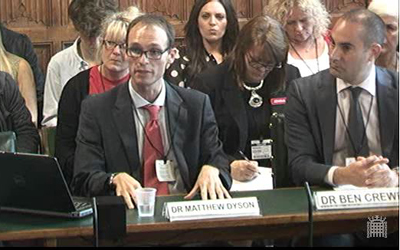 On Wednesday 17 December the House of Commons Justice Select Committee released their follow-up report into the doctrine of Joint Enterprise in criminal law (HC310). The evidence of Cambridge academics Dr Ben Crewe (Institute of Criminology), Dr Matthew Dyson and Professor Graham Virgo (Faculty of Law) is cited throughout the report, with Dr Crewe and Dr Dyson having given oral evidence to the Committee (as reported previously).
On Wednesday 17 December the House of Commons Justice Select Committee released their follow-up report into the doctrine of Joint Enterprise in criminal law (HC310). The evidence of Cambridge academics Dr Ben Crewe (Institute of Criminology), Dr Matthew Dyson and Professor Graham Virgo (Faculty of Law) is cited throughout the report, with Dr Crewe and Dr Dyson having given oral evidence to the Committee (as reported previously).
Joint enterprise is a doctrine of criminal law, involving the imposition of accessory liability where two or more parties have agreed to commit one crime but one of them commits another crime. The parties may be liable for this other crime if they foresaw its commission as a possibility.
The report builds on the Committee's earlier report of January 2012 which had made three primary recommendations:
- for the collation of data on the number of joint enterprise cases and the number of appeals;
- for the Director of Public Prosecutions to issue guidance on when associating with criminal activity itself becomes punishable, particularly with respect to murder; and
- that the doctrine of joint enterprise be enshrined in legislation, using the Law Commission's 2007 Report, 'Participating in Crime' as the starting point.
The 2014 report suggests that, while some progress has been made in clarifying the operation of the law, more is needed. In particular, that the statistics which are available are troubling and further research is needed. The report states that the guidance issued by the DPP was an accurate summary of the law, but its impact on prosecutorial practice is difficult to show without further evidence. Finally, and signalling a significant change from the 2012 report, the Committee now recommend that the Government requests the Law Commission to undertaken an urgent review of the use of the joint enterprise doctrine in murder cases, particularly considering whether foresight that the principal would kill or cause serious bodily harm is an appropriate level of fault.
For comment, please contact Dr Crewe, Dr Dyson or Professor Virgo. See further coverage on the BBC and the Guardian.

 Facebook
Facebook  X/Twitter
X/Twitter  Instagram
Instagram  YouTube
YouTube  Flickr
Flickr  LinkedIn
LinkedIn